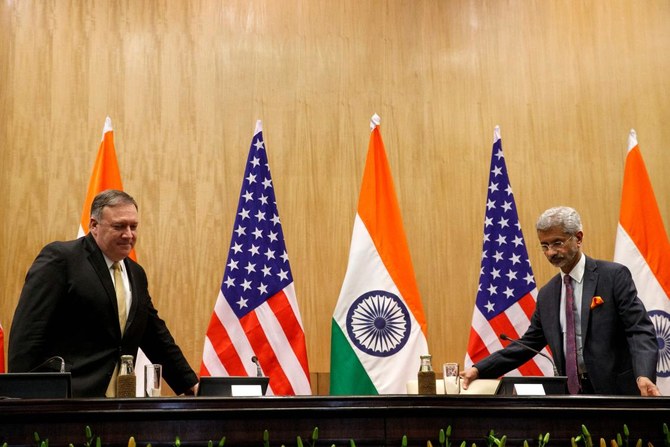NEW DELHI: In a day-long meeting with the Indian leadership in New Delhi, US Secretary of State Mike Pompeo on Wednesday held talks on various issues that had weakened bilateral relations in recent years.
This is Pompeo’s third visit to India, but the first since Prime Minister Narendra Modi’s landslide victory in this year’s general elections.
The visit comes as the US and India are enduring a difficult period in their relationship, with both nations engaged in a bitter dispute over trade tariffs.
Relations have been damaged further by the US threat of sanctions on India’s purchase of the Russian S-400 surface-to-air missile. US sanctions on Iran and creeping instability in the Gulf have added to India’s concerns.
“Our discussion covered trade, energy and defense issues alongside investment concerns,” Subrahmanyan Jaishankar, India’s external affairs minister, said in a joint press conference with Pompeo.
“We’re guided by big pictures, and my urging was that we take pragmatic and constructive views on trade-related issues. The real test would be our intention to address that effectively,” Jaishankar added.
“The Indian government is keen to provide a level playing field to American business, to grow with the world economy and provide the right balance,” he said.
“It’s natural for the two countries to have differences over trade, and we’ll mutually try to address them effectively.”
Pompeo said: “We’re friends. We’ll work together. We can try and find a path together.”
New Delhi imposed retaliatory tariffs on 28 US items earlier this month after the Trump administration ended trade concessions for India on June 1.
On energy issues, Jaishankar said: “We had an open and frank discussion on energy, and we expressed our concerns. I underlined the importance of stability, predictability and affordability in terms of India’s energy imports.”
He told reporters that both countries discussed the situation in the Gulf, and that Pompeo knows India has “big stakes there: Energy, diaspora, business and regional stability.”
On foreign policy issues, Pompeo described Iran as the world’s “biggest sponsor of terror.”
Both leaders refused to answer specific questions on possible exemptions to New Delhi on the purchase of oil from Iran, which is facing US sanctions.
On the question of US opposition to the $5 billion deal for air defense systems between India and Russia, Jaishankar said: “We have relationships with several countries, many of which are significant. They have a history. We’ll do what’s in our national interest.”
He added: “We had a discussion on defense cooperation. It’s important to display trust and confidence in each other if we want this to grow.”
Both countries discussed China’s growing presence in the Indo-Pacific region. “Our partnership in the Indo-Pacific is for a purpose, not against somebody, and that purpose is peace, security, stability, prosperity and rules,” said Jaishankar.
“We’re looking for a landscape where a number of independent players can work together for global good.”
Pompeo said: “The US-India relationship is already reaching a height, particularly in defense cooperation, a common vision for a free and open Indo-Pacific, and growing cooperation in energy.”
Before holding talks with Jaishankar, Pompeo met Modi and congratulated him on his electoral victory.
Harsh V. Pant of the New Delhi-based Observer Research Foundation told Arab News: “Pomeo’s visit is very significant and sets the tone for the future US-India relationship. It comes at a time when the relationship is passing through some difficulty.”
Pant said: “One visit can’t solve the trade problem. It’s a structural problem in many ways. Trade has always been a frustrating issue for the relationship, but it’s a very small part in the larger strategic ties between the two nations.”
He added: “The convergence between US and India is based on the larger structural reality of the regional and global balance of power. So long as both countries are mindful of that, I think the relationship can grow.”
Pant said: “Where India will have to rethink is on the issue of transnationalism. It isn’t enough for India to say its rise is good for America therefore America should help India. The US is changing, and you’ll have to respond to the changing America.”














